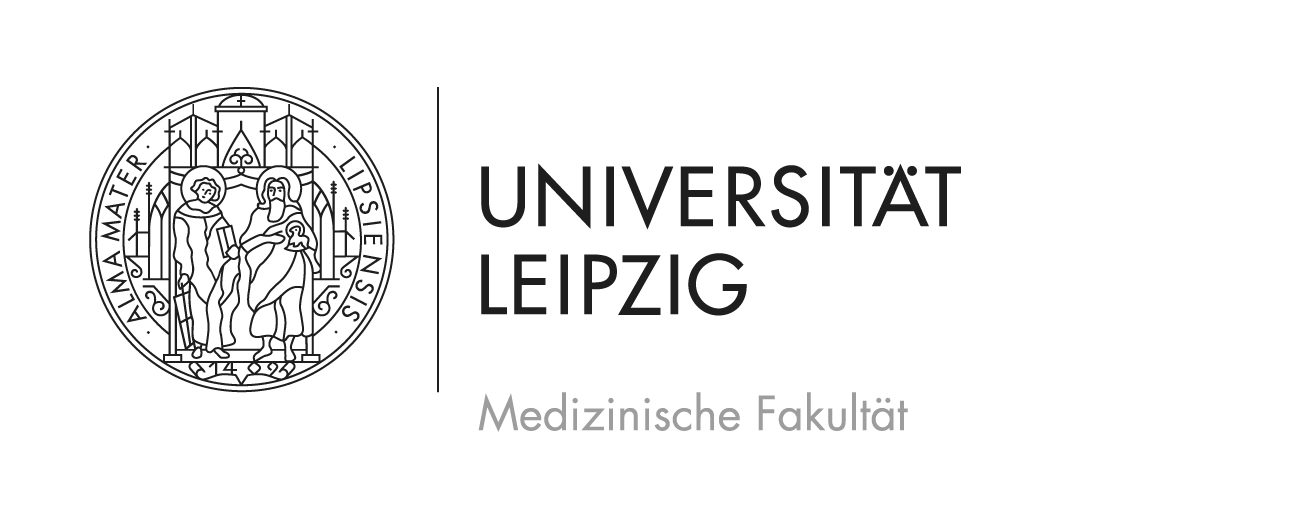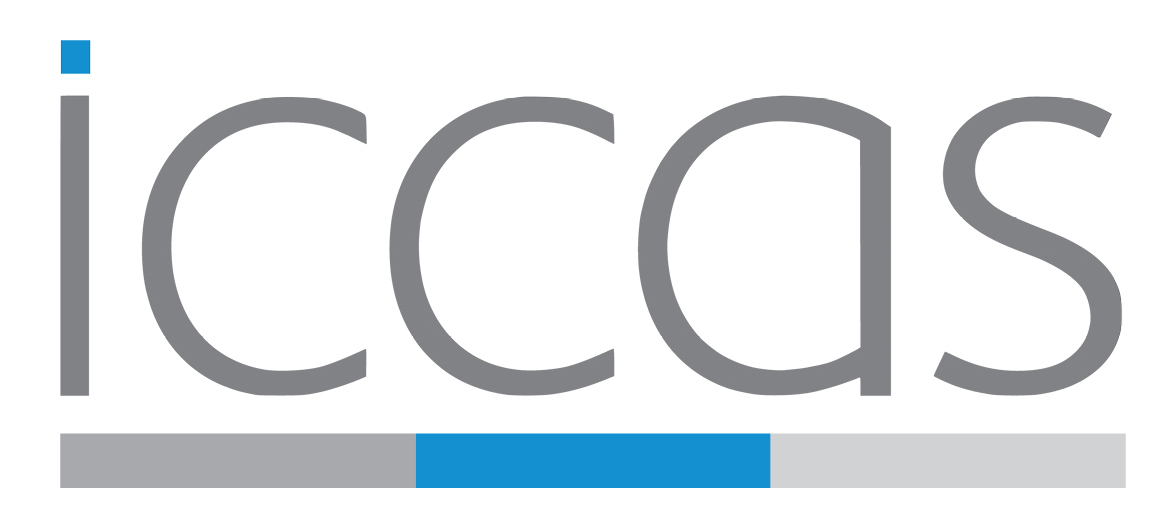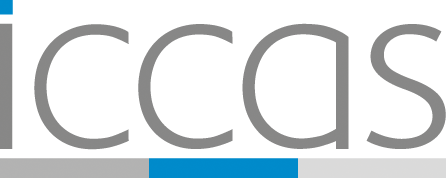
01.09.2014
 Sandra von Sachsen mit Vortrag auf ICBES in Prag
Sandra von Sachsen mit Vortrag auf ICBES in Prag
01 September 2014
Sandra von Sachsen was speaker at the International Conference on Biomedical Engineering and Systems (ICBES) in Prague. At the specialist conference, researchers met who deal with theories and applications of biomedical sciences and biomedical engineering.
Von Sachsen’s lecture on computer-assisted defect classification for the treatment of cervical spinal stenosis presented important research results of the HWS-group – a coding scheme for the description of identified defect characteristics of degenerative modified cervical spinal stenosis and a method for the fully automated detection of stenosis of the spinal canal in the MRT image. The audience asked questions concerning the applicability of the method in the diagnosis of vertebral body fractures. According to Sandra von Sachsen, this is quite possible. A crucial prerequisite is the providing of a greater amount of image data for the image-based classification of the relevant vertebral fractures.
09.08.2014
 ICCAS-Workshop zum Teilprojekt 6 – Demonstratoren im OR.NET
ICCAS-Workshop zum Teilprojekt 6 – Demonstratoren im OR.NET
09. August 2014
OR.NET ist ein vom Bundesministerium für Bildung und Forschung gefördertes Verbundprojekt und steht für „sichere dynamische Vernetzung in Operationssaal und Klinik“. Das ICCAS – von Beginn an Partner in fast allen Teilprojekten – arbeitet seit Anfang des Jahres im Teilprojekt 6 an der Koordinierung des Aufbaus aller Demonstratoren sowie an der Erstellung des Integrationsdemonstrators am Standort Leipzig.
Ca. 20 Partner, darunter Vertreter namhafter Medizintechnikfirmen, Hersteller klinischer Informationstechnologien, Anbieter integrierter Operationssäle sowie Wissenschaftler aus Forschungsinstituten, sind am Teilprojekt 6 beteiligt. Deren Synchronisierung findet regelmäßig in Workshops statt. So auch jenem, der Ende Juli von den Teilprojektleitern Max Rockstroh (ICCAS) und Markus Birkle (UKL Heidelberg) am ICCAS organisiert wurde. Es gab hauseigene Vorträge zum Thema Workflowmanagement und Vorträge der Partner zu den gegenwärtigen Arbeiten an zentralen Komponenten der Open Surgical Communication Platform (OSCP). Zudem wurden die aktualisierten Versionen der Storyboards (Drehbücher) für die Demonstratoren vorgestellt. Die Demonstratoren dienen dazu, die im Gesamtprojekt entwickelten Konzepte und Systeme später in einer realitätsnahen Umgebung anzuwenden.
Der Workshop bot genügend Raum für konstruktive Lösungsvorschläge. Zudem nutzten Teilnehmer die Gelegenheit, den gegenwärtigen Demonstrator-OP des ICCAS in Augenschein zu nehmen.
OR.NET is a collaborative project funded by the Federal Ministry of Education and Research and stands for “Secure and dynamic networking in the operation room”. From the very start, the ICCAS has been partner in nearly all sub-projects of this lighthouse project. Since the beginning of this year, the ICCAS has been working on the coordination of the construction of all demonstrators and on the establishment of the integration demonstrator at the Leipzig location.
About 20 partners including representatives of renowned medical technology companies, manufacturers of clinical information technology, provider of integrated operating rooms as well as scientists from research institutes are involved in the sub-project 6. The synchronization of the partners takes regularly place in workshops. At the end of July, such a workshop was organized by the subproject leaders Max Rockstroh (ICCAS) and Markus Birkle (UKL Heidelberg) at the ICCAS. The workshop included in-house presentations on workflow management and guest lectures about the current work on the central components of the Open Surgical Communication Platform (OSCP). Furthermore, updated versions of the storyboards for the demonstrators were presented. The demonstrators will be used to apply the overall project concepts and systems in a realistic environment.
The workshop on sub-project 6 left enough room for proposed solutions. Besides, participants took the opportunity to inspect the current demonstrator–OR.

08.08.2014
 Dr. Kerstin Denecke bringt Leipzig – Auckland – Forschungsvorhaben ins Rollen
Dr. Kerstin Denecke bringt Leipzig – Auckland – Forschungsvorhaben ins Rollen
08 August 2014
Last year in autumn, employee of New Zealand’s National Institute for Health Innovation (NIHI) visited the ICCAS to explore common research interests. They already showed interest in working together with the ICCAS at that time. Now the return visit followed by Dr. Kerstin Denecke, who traveled to Auckland with plenty information material about the ICCAS and the work of the research group Digital Patient- and Process Modell. Her points of reference were the NIHI – where studies for information technologies in the healthcare sector are conducted – and the Department of Computer Science at the University of Auckland. Furthermore, an initial meeting with the Bioengineering Institute took place which also deals with patient modelling.
The conversations at the NIHI were successful. Both sides see benefits in a closer cooperation. While the Leipzig scientists are leading in methodical development, the Auckland researchers have much to offer in the field of patient studies. The reason for that is a good availability of patient data gathered over decades. Just as the ICCAS, the National Institute endeavors developments of standardized applications which use openEHR – a good reason to remain in contact.
Further research periods are planned. The Leipzig – Auckland – Research is taking shape.
23.07.2014
 Dabeisein während der Digital Operating Room Summerschool (DORS) des ICCAS
Dabeisein während der Digital Operating Room Summerschool (DORS) des ICCAS
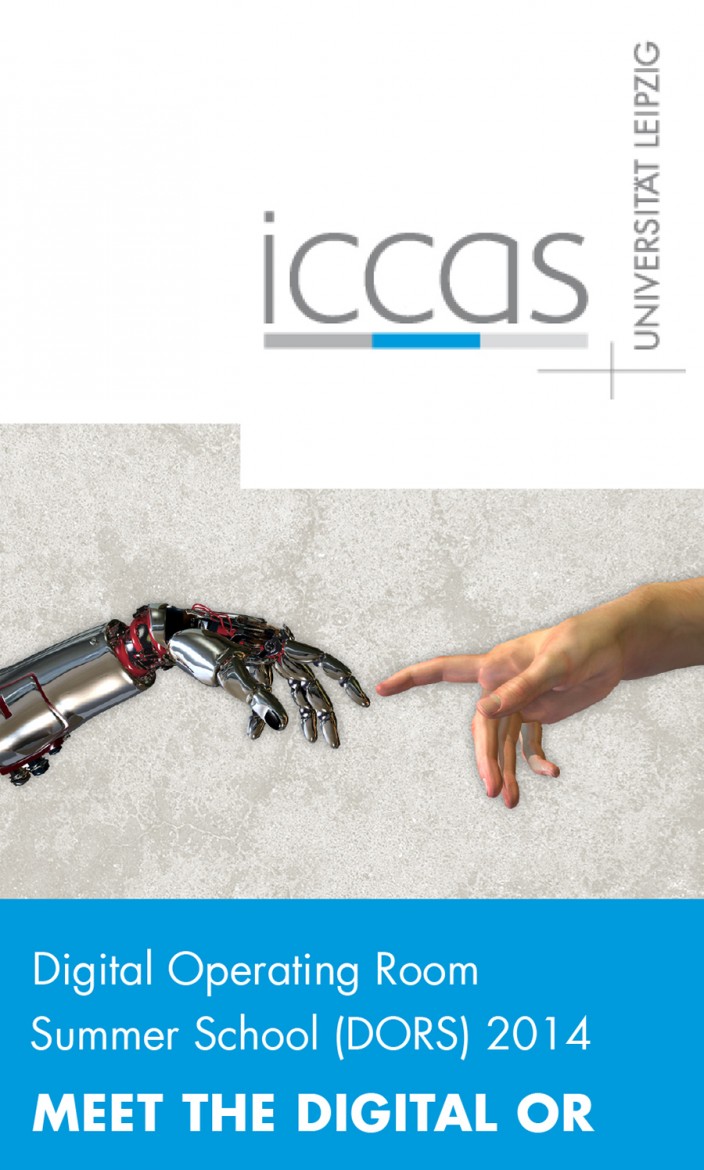 Wenn am 22. September 2014 die Summerschool des ICCAS für eine Woche ihre Türen öffnet, erwartet die Teilnehmer ein reich gefülltes Programm, das die Entwicklungen und Herausforderungen im Bereich Informationstechnologie für den digitalen Operationssaal zum Gegenstand hat.
Wenn am 22. September 2014 die Summerschool des ICCAS für eine Woche ihre Türen öffnet, erwartet die Teilnehmer ein reich gefülltes Programm, das die Entwicklungen und Herausforderungen im Bereich Informationstechnologie für den digitalen Operationssaal zum Gegenstand hat.
In den Räumlichkeiten des neuen Augusteums sowie der Bibliotheca Albertina werden erfahrene Wissenschaftler aus der Medizin, dem Ingenieurwesen und der Informatik ihre Erfahrungen auf den Gebieten medizinische Bildverarbeitung, Computer Vision und IT-Technologien weitergeben und den Teilnehmern beratend zur Seite stehen. Zudem sprechen Klinikbetreiber über Möglichkeiten der Umsetzung neuer IT-Infrastrukturen in ihren Häusern. In einem praktischen Teil werden die Teilnehmer in die menschliche Physiologie und Anatomie eingeführt. Eine Hospitation im OP soll Arbeitsabläufe und Technologien näher bringen. Im ICCAS Konzept-OP können schließlich neueste Entwicklungen anhand von Prototypen und Simulatoren selbst getestet werden.
Angesprochen sind vor allem junge Wissenschaftler und Doktoranden, die sich den neuen Anforderungen an eine personalisierte Medizin mithilfe anwendbarer technologischer Assistenz stellen und dazu Expertenkenntnisse aus erster Hand erfahren möchten. Aber auch alle anderen Interessenten, die den direkten Austausch innerhalb der wissenschaftlichen Community im Bereich computerassistierte Chirurgie suchen, sind herzlich willkommen.
Die Teilnehmerzahl ist begrenzt. Anmeldungen können bis einschließlich 31. 08. 2014 erfolgen.
Das ICCAS freut sich auf lehrreiche Tage in Leipzig, in denen auch das gegenseitige Kennenlernen nicht zu kurz kommen soll.
Weitere Informationen sowie das Anmeldeformular zur DORS gibt es unter www.iccas.de/dors.
 When the ICCAS – Summerschool will open its doors for one week on 22nd September 2014, participants can expect a richly filled program which has the developments and challenges in the field of information technology for the digital operating room as subject matter.
When the ICCAS – Summerschool will open its doors for one week on 22nd September 2014, participants can expect a richly filled program which has the developments and challenges in the field of information technology for the digital operating room as subject matter.
In the premises of the new Augusteum and the Bibliotheca Albertina, experienced scientists from medicine, engineering and computer science will share their experiences in the fields of medical image processing, computer vision and IT-technologies. They will also provide advisory support to the participants. Furthermore, hospital operators speak about the possibilities of implementing new IT-infrastructures in their institutions. During a practical session participants will be introduced into the human physiology and anatomy. An operating room visit will show the current state of the art OR-technologies and workflows in practice. Latest developments can finally be tested on prototypes and simulators in the ICCAS Concept-OR.
Especially young researchers and Ph.D. students should feel concerned who want to face the new requirements on personalized medicine and who want to receive firsthand knowledge from experts. But all other interested persons who are looking for a direct exchange within the scientific community of computer-assisted surgery are very welcome.
The number of participants is limited. Registrations can be submitted until 31st August 2014.
The ICCAS is looking forward to informative days in Leipzig where also the mutual acquaintance should not be neglected.
Further information and the registration form can be found under: www.iccas.de/dors.

 DPM-Beitrag auf 37. ACM SIGIR Konferenz in Australien
DPM-Beitrag auf 37. ACM SIGIR Konferenz in Australien
23 July 2014
Information processing and knowledge management are important workspaces of the DPM research area. Sentiment Analysis of clinical texts is one part of it and the specialty of Yihan Deng. The computer scientist reported about the current research results of this rather unusual method of information retrieval in the medical field at this year’s International ACM SIGIR Conference in Gold Coast (Australia). Among the participants was also DPM junior research group leader Dr. Kerstin Denecke, who is involved in the investigations just like the physician Matthäus Stöhr. The scientists prove that medical records are far away from being objective data sets. They rather include important observations and assessments of the clinical staff about the current health situation of the patients. This allows deducing indications for further therapeutic measures. The sentiment analysis can thus provide important information for the digital patient model which otherwise would remain hidden in the patient records.
The conference – organized by the Association for Computing Machinery (ACM) and the Special Interest Group on Information Retrieval (SIGIR) – is one of the most important events on the topic of “Information Retrieval”. Here, scientists come together who are concerned with the recognition, organization, storage, retrieval and distribution of information in public and private sectors.
[nggallery id=14]

11.07.2014
 ICCAS empfängt russische Delegation
ICCAS empfängt russische Delegation
10 July 2014
A delegation of academics, physicians and students from the Faculty of Fundamental Medicine of the Buryat State University in Ulan-Ude visited the ICCAS on 9th July 2014.
After Professor Thomas Neumuth had warmly welcomed the guests from the capital of the Russian Republic of Buryatia, Mario Cypko and Stefan Franke gave insights into current research work at the ICCAS. Mario Cypko presented previous results and further projects relating to the digital patient model. He initiated the guests into the development and use of Multi-Entity Bayesian Networks for improving the therapeutic decision making. Following, interesting questions about actuality and scope of the applicability and about privacy had to be answered.
During the live demonstration in the ICCAS concept-OR Stefan Franke was closely surrounded by the participants. Whether surgical milling tool, ultrasound with navigating puncture needle or navigation system for ENT surgery – the modern devices were carefully examined. Unfortunately, the guests had very little time in their bags, because the ICCAS was only one of many program points of the Leipzig stay.
The Buryat State University is one of the oldest universities in Siberia and an important establishment for modern science and higher education in the Russian Republic. Professors and students of the Faculty of Medicine regularly organize fact-finding trips to technologically advanced institutions in Germany and other European countries to promote the concept of Integrative Medicine using traditional and modern methods of treatment and innovative technologies and to forge collaborations.
[nggallery id=13]

03.07.2014
 Erfolgreiche Präsentation auf dem International Congress of Computer Assisted Radiology and Surgery
Erfolgreiche Präsentation auf dem International Congress of Computer Assisted Radiology and Surgery
03 July 2014
With visionary thoughts in mind the ICCAS participants of the 28th CARS-Congress returned to their research places.
Both the own technical contributions and the visits of other sessions and presentations strongly boosted the dialogue with international medical experts and clinical informatics. After his lecture on system development for the modeling of medical treatment decisions Mario Cypko received a cooperation request from an institute in Moscow. Furthermore, he could take new approaches and solutions to ethical questions for his project, concerning computer-assisted therapeutic decisions.
Matthäus Stöhr’s tumor board – analysis from a researching clinician’s point of view also met with great response. An US American company sees great potential in the information models and is striving for cooperation with the ICCAS.
Also Philipp Liebmann found suggestions for the further research work of the Standard-group. In his lecture on the status of DICOM and IHE in surgery, he presented existing solutions as well as data objects and IHE-profiles currently under development. During the DICOM WG 24 Meeting further development approaches were discussed.
[nggallery id=12]

 Zwei unterschiedliche Problematiken – zwei unterschiedliche Konferenzen – ein vorrangiges Ziel
Zwei unterschiedliche Problematiken – zwei unterschiedliche Konferenzen – ein vorrangiges Ziel
07. July 2014
Her last two research trips led Dr. Kerstin Denecke to Vienna, at Austrian’s largest event of the e-health sector – the eHealth Summit Austria and to Reykjavik, at the most important conference on language resources and evaluation – the LREC. At both events, the research leader of the DPM-group spoke about issues which are associated with the use of data from the Internet and other mobile technologies for medical purposes.
So, the first lecture concerned “Ethical Aspects of Using Medical Social Media in Healthcare Applications“ – not only in Austria an intensively discussed topic in the field of IT healthcare. Dr. Denecke made clear the importance of a legal assurance of data protection directive and ethical principles in the evaluation and use of digital information in healthcare by means of literature analysis and considerations of the Social Media – Working Group of the International Medical Informatics Association (IMIA)
The presentation at the LREC dealt with the question of how medically relevant information can be automatically extracted from Internet texts. Therefore, the computer scientist presented various language processing tools which were applied to Medical Social Media. For the further work on the digital patient model information about biomedical textmining and text corpora from the field of medicine were of interest.
Dr. Denecke and her research group pursue the aim of integrating information from the patients (e.g. about the quality of life and lifestyle) in the therapeutic decision in addition to data from clinical documents and the experiences of medical experts. This information is primarily contained in Social Media text forms – an almost inexhaustible source, whose special use calls for limits.
02.07.2014
 Kurzweil auf der Langen Nacht der Wissenschaften Leipzig
Kurzweil auf der Langen Nacht der Wissenschaften Leipzig
02. Juli 2014
Vergangenen Freitag lud das ICCAS zur vierten Langen Nacht der Wissenschaften in die BIO CITY LEIPZIG ein. Dort durften Besucher ein interaktives Trainingssystem ausprobieren, mit dem das OP-Personal die Anwendung von chirurgischen Instrumenten üben kann.
Bernhard Glaser, Lucas Koch und Tobias Schellenberg hatten bis zur Mitternachtsstunde alle Hände voll zu tun, die vielen Probierfreudigen in das Hin und Her der virtuellen Instrumente einzuweisen. Mit einem so mächtigen Andrang hatten die Wissenschaftler nicht gerechnet. Ob Alt, ob Jung, ob Fachpersonal oder Laie – die Gäste hatten sichtlich Spaß am Tablet- Instrumententisch, dessen Bedienung für die Smartphone-Generation ein Kinderspiel war. Das innovative Trainingssystem kam vor allem bei Ärzten und Klinikpersonal sehr gut an.
Für Bernhard Glaser und sein Team verging die Wissenschaftsnacht wie im Flug. Was von ihr bleibt, sind neue Kontakte, weitere Anregungen sowie Erinnerungen an eine begeisternde Veranstaltung.
[nggallery id=10]02 July 2014
Last Friday the ICCAS invited to the fourth Long Night of the Sciences at the BIO CITY Leipzig. There, visitors were able to try out an interactive training system, with which OR-personnel can exercise the handling of surgical tools.
Bernhard Glaser, Lucas Koch and Tobias Schellenberg had their hands full until midnight introducing the guests to the moving of the virtual instruments. The scientists had not expected such a large crowd. Whether old, whether young, whether professional or layman – the visitors obviously had fun at the tablet-instrument table, whose handling was a child’s play for the smartphone-generation. The innovative training system was very well received especially by physicians and clinical staff.
For Bernhard Glaser and his team the science night just flew by. What of it remains are new contacts, further inspirations and an inspiring event.
[nggallery id=10]
25.06.2014
 ICCAS lädt ein zur Langen Nacht der Wissenschaften
ICCAS lädt ein zur Langen Nacht der Wissenschaften
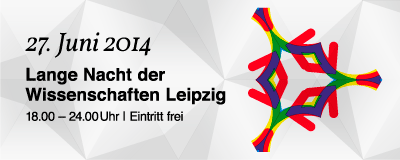 Beim nächtlichen Streifzug durch die Leipziger Wissenschaftslandschaft können Besucher am ICCAS-Stand Skalpell, Knochenhebel oder Arterienklemme vom Instrumententisch zum Operateur wandern lassen und zwar – wie von Geisterhand – ohne echte chirurgische Instrumente und reales Operationsgeschehen.
Beim nächtlichen Streifzug durch die Leipziger Wissenschaftslandschaft können Besucher am ICCAS-Stand Skalpell, Knochenhebel oder Arterienklemme vom Instrumententisch zum Operateur wandern lassen und zwar – wie von Geisterhand – ohne echte chirurgische Instrumente und reales Operationsgeschehen.
Ein von Bernhard Glaser am ICCAS entwickeltes Touchscreen – System macht es möglich. Der Diplominformatiker tüftelte an einer Lösung, wie der Umgang mit chirurgischen Werkzeugen realitätsnah geübt werden kann, ohne OP-Situationen nachstellen zu müssen. Er entwickelte ein System, das den Instrumententisch simuliert und die darauf verfügbaren Instrumente virtuell greifbar macht.
Wer neugierig geworden ist, kann während der Langen Nacht der Wissenschaften einmal selbst in die Rolle einer assistierenden Person schlüpfen und dem Operateur am Monitor die verschiedensten Instrumente reichen. Bernhard Glaser und sein Team aus der MAI-Gruppe freuen sich auf interessante Abendstunden mit vielen Probierwilligen!
Wo? am ICCAS-Stand im Foyer der BIO CITY LEIPZIG, Deutscher Platz 5
Wann? von 18-24 Uhr durchgehend

During the trip through the Leipzig scientific landscape visitors can move scalpel, bone lever or arterial clip from the instrument table to the surgeon and that – as if by magic – without proper surgical instruments and real surgery procedures.
A touch screen system developed by Bernhard Glaser at ICCAS makes it possible. The computer scientist worked on a solution to train the handling with surgical tools in a realistic way without reproducing OR-situations. He developed a system that simulates the instrument table and virtual realizes its instruments.
Anyone who is curious can slip oneself into the role of an assisting person and pass the surgeon on the monitor various instruments. Bernhard Glaser and his team of the MAI-group look forward to interesting evening hours with many people who want to try out.
Where? At the ICCAS-stand, Foyer of the BIO CITY LEIPZIG, Deutscher Platz 5
When? From 06:00 p.m. until midnight, open throughout
